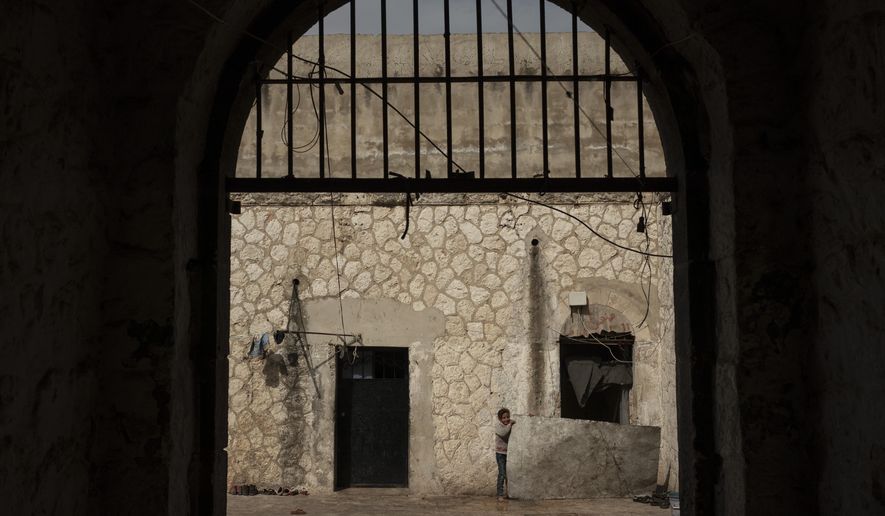After months of bloodshed and conflict, diplomats say the landmark cease-fire agreement in Syria forged between Turkey and Russia is “holding up to expectations” and could pave the way for negotiations in Syria’s war-torn Idlib province.
Idlib, the last major rebel-held region of Syria, has seen the brunt of the latest battles in the nearly decade-long Syrian war. With hundreds of thousands fleeing there in the face of a renewed offensive by the troops of Syrian President Bashar Assad, Turkey and Russia — who back opposing sides in the civil war — agreed to a cease-fire in Idlib on March 5.
Despite grim predictions of a looming bloodbath, the Trump administration’s point person on the Syrian crisis said Thursday he was still hopeful the door remains open to peace negotiations, if Syria’s Russian allies convince Mr. Assad to pull back.
“We are absolutely convinced that we can find a political solution to this conflict, with one condition: the Idlib cease-fire has to hold,” Ambassador James Jeffrey, the State Department’s special representative for the Syrian war and the fight against Islamic State, said Thursday.
And even as COVID-19 now threatens Syria and the region, U.S. diplomats say the Trump administration is not easing sanctions and other pressure designed to force Mr. Assad to negotiate.
“We think that the cease-fire in Idlib is encouraging the small steps towards the constitutional committee, [and] the bad situation the Assad regime has found itself in economically in terms of its reputation leaves the door a bit more open for success in these discussions,” Mr. Jeffrey told a telebriefing Thursday organized by the Atlantic Council.
Ibrahim Kalin, the deputy chairman of the Turkish Security and Foreign Policy Council and an adviser to President Recep Tayyip Erdogan, told the briefing that the cease-fire was only a temporary solution, and that Mr. Assad may still be tempted to press his military advantage.
A negotiated political solution also might lead to Mr. Assad losing his grip on power, Mr. Kalin noted.
“We are facing difficulties with the Syrian regime because the regime is not interested in advancing the work of the constitutional committee, because they are afraid of a revised or rephrased constitution that will be binding,” Mr. Ibrahim said.
While many nations have provided support to Syrian refugees over the years, Mr. Ibrahim said he hopes to see greater “cooperation and partnership” from the international community in pressing for a diplomatic solution to the crisis.
“To end the human suffering in Idlib, or in any part of Syria, it requires serious political work, so we should not lose sight of this fact,” Mr. Ibrahim said.
With the recent appearance of the coronavirus pandemic in the region, officials are concerned that the virus could pose a dangerous threat to the more than 1 million Syrians who were displaced due to the crisis in Idlib. Before the arrival of the virus, Mr. Jeffrey said the humanitarian crisis was already “horrendous,” but the presence of COVID-19 “will make it even worse.”
But despite the increasingly long odds for rebel groups holed up in Idlib, Mr. Jeffrey said there was little sign displaced Syrians want to return to the parts of Syria firmly under Mr. Assad’s control.
“No matter how bad it gets, almost none of that population will return to Assad’s control unless forced to,” Mr. Jeffrey said. “The situation in his areas is so bad for that population that they will put up with essentially everything. The COVID situation will make it worse, but I don’t think it will have an overall impact on the diplomatic layout.”
The United Nations has approved a plan that will allow $180 million in U.S. aid to cross into northeastern Syria via Turkish border crossings. Mr. Ibrahim said health officials are working to determine the true extent of coronavirus cases in Syria since information from the Assad regime is likely “unreliable.”
Mr. Jeffrey also cautioned that the focus on Idlib could take away from the U.S.-led coalition fight against Islamic State, which still carries out sleeper cell operations along the Syrian-Iraqi border.
“We have seen ISIS gaining ground there, attacking even towns, and at least briefly holding territory,” Mr. Jeffrey said. “That has to stop. We’ve offered to cooperate with the Russians on this, but as long as the focus is on Idlib that is yet another consequence.”




Please read our comment policy before commenting.